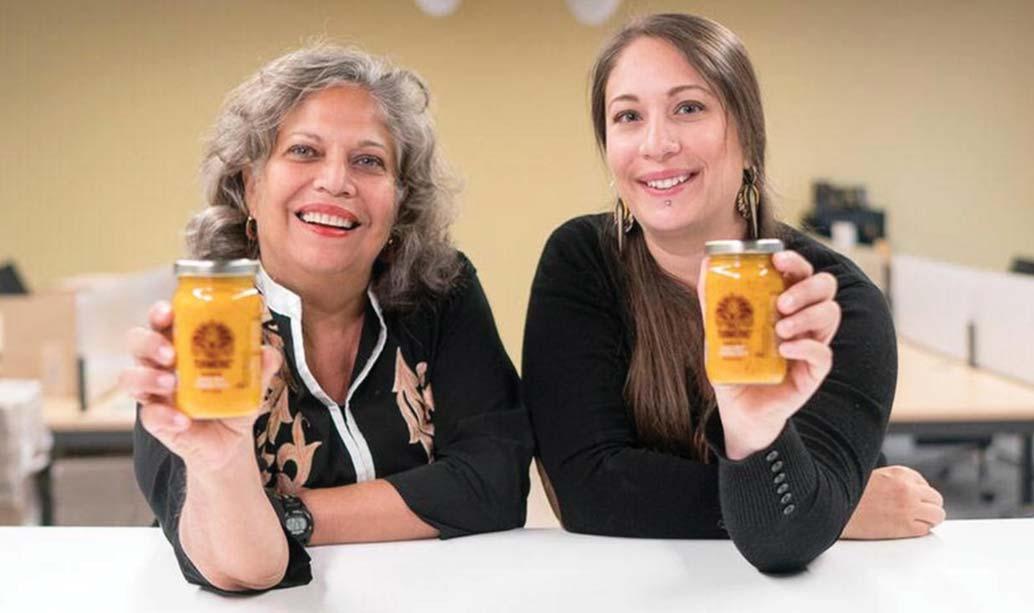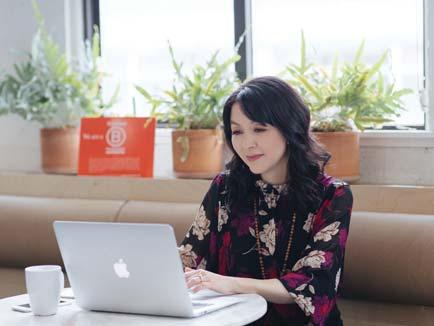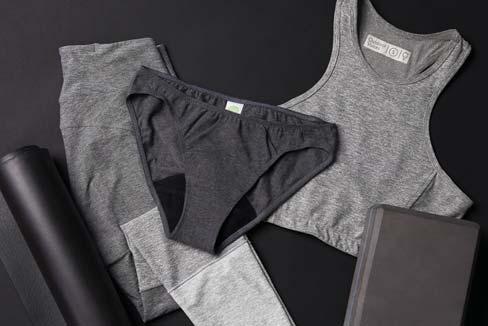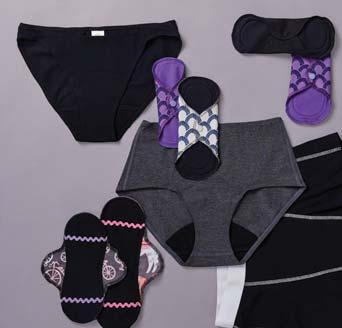
10 minute read
FUNDS FOR FOUNDERS
from Women in Business Spring 2020
by GLACIER MEDIA DIGITAL LIMITED PARTNERSHIP dba BUSINESS IN VANCOUVER
FUNDS FOR FOUNDERSS
Federal funds, specialized loans and earmarked bank funds broaden financing options for female entrepreneurs
Fairware COO and co
founder Sarah White (left)
and CEO and co-founder
Denise Taschereau recently
expanded their Vancouver
based sustainable
promotional products
company into the U.S.
with the help of federal
funding • SUBMITTED

Federal funds helped Naledo’s mother-and-daughter team, CEO Umeeda Switlo (left) and COO Nareena Switlo, expand
their turmeric paste enterprise into the U.S. • SUBMITTED
BRIGITTE PETERSEN
Female entrepreneurs have a variety of options when it comes to funding initiatives to help them boost their businesses.
Fairware, a Vancouver-based sustainable promotional products agency, was one of 34 B.C. businesses owned or led by women to recently receive funding through the federal government’s new Women Entrepreneurship Fund (WEF), administered through Western Economic Diversification Canada. Each business received non-refundable grants of up to $100,000 to help them grow and reach new export markets.
The fund, announced in the 2018 budget, is part of a larger federally funded Women Entrepreneurship Strategy to advance women’s economic empowerment by doubling the number of female-owned businesses in Canada by 2025. More than 300 applications were approved for a total of about $30 million in WEF funding across the country. According to the strategy’s website, female entrepreneurs face unique barriers, own fewer than 16% of businesses and are under-represented in the economy. Fairware, which now has offices south of the border, received a $100,000 grant to support its U.S. expansion.
“We have always had about one-third of our sales from U.S. accounts, but the growth of our U.S. sales over the past couple of years, of 40% plus per year, has been outpacing our Canadian sales growth,” says Denise Taschereau, CEO and co-founder of Fairware. COO and co-founder Sarah White says the funding supported three main activities: “setting up the U.S. company, hiring account managers in Brooklyn and Oakland to service the east and west coast, as well
as Vancouver-based support staff, and increasing our marketing presence in key markets and sectors in the U.S.”
If Fairware had not received funding, the company’s expansion strategy could have taken up to three years, according to Taschereau.
“This injection of funds allowed us to fast-track our plan and have a team in place within six months of receiving our funding,” she says.
Fast-tracking worked for Fairware, as the overall company grew by about 14%, while U.S. sales grew by 29% between April and September 2019 compared with the same period the previous year. Its U.S.-specific online search traffic also increased by 40%.
Naledo, a mother-and-daughter-run social enterprise that makes Truly Turmeric, a whole-root turmeric paste, also received $100,000 through the fund. COO Nareena Switlo says the organization, which supports hundreds of small-scale growers in Belize, has been using the funding to develop a new product line.
“ We h ave a l so u se d t he f u nd i n g to e x pa nd our distribution in Canada – now we are in over 1,000 stores – and launch into the U.S.,” says Sw itlo, whose fa m i ly, i nclud i ng her mother, Naledo CEO Umeeda Switlo, fled Uganda and came to Canada as refugees in the 1970s. “We sent our first shipment of Truly Turmeric to our U.S. distribution partner UNFI in August 2019. Truly Turmeric can now be found in health food stores in the Pacific Northwest, and we plan on expanding nationally in 2020.”
Just as in Fairware’s case, receiving the funding made an earlier-than-planned expansion into the U.S. possible for Vancouver-based Naledo.
“The team managing the fund is encouraging and supportive of our goals, and as women in business, that means a lot to have someone cheering you on,” Switlo says. “The reporting methods are quick. Some grants can have you stuck in hours of admin work, but the fund has been wonderful to work with.”
INVESTING IN STEM With only about 5% of technology startups owned by women, according to the non-profit Startup Canada, female entrepreneurs in the STEM – science, technology, engineering and math – fields often need support to help them start and nurture their businesses. Startup Canada partners with small-business online lender OnDeck Canada to invest in female-led companies through the Startup Canada Women Founders Fund, which provides microgrants of up to $5,000.
Vancouver-based Granted Consulting Inc. was one of five recipients of the 2019 Women Founders Fund, out of more than 200 applicants across Canada. The company helps small and medium-sized enterprises learn about and navigate the government grant process.
Granted Consulting used its $4,000 grant to set up an on-site video film studio, says CEO Stephanie Sang. “It paid for equipment and some consulting so that we can produce short clip videos for social media and develop a YouTube/Vimeo presence to share information about grant programs for businesses in Canada,” Sang says. “We have invested in professional videos this year, and it’s expensive. The ability to be lean in production of videos used for quick marketing clips stretches our marketing budget considerably and also gives us the ability to build up this expertise in-house.”
Also supporting investment in female-led technology companies is BDC Capital with its Women in Technology Venture Fund. The fund includes direct investment in female-led tech companies striving to disrupt markets, as well as indirect investment in emerging venture funds. BDC also works with various partners to provide mentorship, networking and tools for women working in technology.
NON-BANK LOAN OPTIONS While it does not provide grants, the non-profit Women’s E nter pr i se Cent re ( W E C) of fers small-business loans of up to $150,000 along with free, ongoing advice, training and mentoring programs for female entrepreneurs in B.C. It also provides access to up to an additional $100,000 through its partnership with BDC.
The centre offers two main loan options through its Primary Lending Program and Specialty Loans, which includes a Youth Business Loan. WEC’s loans feature lower security and equity requirements, competitive interest rates and smaller fees than those of many other lenders.
WEC got a funding boost itself when more funds were made available to advance women’s entrepreneurship last June through the Women Entrepreneurship Strategy Ecosystem Fund. The federal government committed $2.7 million to WEC. According to a media release, the organization plans to add more business advisers, expand support for exporters and develop new training, including programs designed for immigrant and Indigenous entrepreneurs, over the next four years.
BEYOND BASIC BANKING Some major banks run initiatives with funds earmarked for businesses owned by women. After identifying that access to capital and credit is a significant issue for female entrepreneurs, BMO Bank of Montreal committed to advancing $3 billion in capital to female-owned businesses across Canada over three years starting in 2018. This is in addition to a previous commitment of $2 billion in credit. BMO also recently launched an online Small Business Resource Hub offering tools, tips and templates for female entrepreneurs at various stages of business.
The Scotiabank Women Initiative also supports businesses owned and led by women in Canada. The program, designed to address the significant challenges female business leaders face in achieving growth, provides access to capital, education and mentorship.É
THE TEAM MANAGING THE FUND IS ENCOURAGING AND SUPPORTIVE OF OUR GOALS, AND AS WOMEN IN BUSINESS, THAT MEANS A LOT TO HAVE SOMEONE CHEERING YOU ON j Nareena Switlo COO, Naledo



MEET THE CPA AND ENTREPRENEUR WHO’S PIONEERING PERIOD POSITIVITY.
From sustainable period products to gender inclusivity, Lunapads co-founder and CEO Suzanne Siemens is proof that business has a place in social change.
Every year 20 billion pads, tampons and applicators are dumped into landfills. But in the early 2000s, people weren’t talking about climate change, and they certainly weren’t talking about menstrual waste. How do you persuade people to replace disposable pads and tampons with sustainable alternatives when the topic of menstruation is taboo?
Vancouver-based Lunapads has been taking that challenge head-on since 2000. “It was hard, and people thought we were crazy,” says Suzanne Siemens, the co-founder and CEO of Lunapads. “We were ahead of our time and thinking a decade beyond what people were ready to talk about.”
A STRONG FOUNDATION Siemens is a CPA and it was this training and experience that laid the foundation for her success. “Knowing I was strong in math, accounting felt like a good career fit.” But most importantly, Siemens says that she knew it would give her a springboard from which she could pursue opportunities in business. “I knew I could find myself in a corporate job or as an entrepreneur,” she says. “So getting a CPA designation would provide a strong business foundation and be an asset going forward.”
After working in the corporate world for nearly a decade, Siemens was burnt out and feeling disconnected. Then she met Madeleine Shaw in a leadership course. Shaw had developed early versions of the products and written
a business plan, however needed help scaling the business. With their complementary skills, the two decided to become business partners.
Siemens saw it as an opportunity to leverage her business and accounting foundation to get creative and innovate. “Becoming a co-founder of Lunapads was my stepping stone to entrepreneurship,” says Siemens. “It has now become a bit of a mission of mine to show that business can be a powerful way to effect social change.”
BUSINESS WITH A CONSCIENCE Lunapads are washable alternatives to traditional disposable menstrual products. Reusable menstrual products not only save the consumer money, but they’re easier on the planet.
Today it might seem like a no-brainer, but in the early 2000s, it was challenging to broach the topic.
“You would get people who would say, ‘oh, that’s gross,’” says Siemens. Their strategy was to target early adopters who wouldn’t be put off by the topic.
Over the years the company grew, but in recent years, body positivity and climate change have roused huge interest in menstrual health and reusables.
Now that the world is starting to catch up with period positivity, Lunapads is leading in new ways, including championing gender diversity in the menstrual conversation. Not everyone who has a period identifies as a woman, and not every woman or girl menstruates. Customers requested gender diverse designs and more inclusive marketing, and Lunapads listened.
Through every level of production, Lunapads is a business with a conscience. Textile scraps are donated to a sustainable waste management company that repurposes them to make clothing and children’s toys. The company also funds programs to supply washable pads to people in developing nations.
“The CPA designation has ethics at its foundation,” says Siemens. “It grounds you on a fundamental basis. Whenever you’re making a business decision, you use that lens to say, okay, what’s the best way to do this? What’s the greater good? And then how can you even do it better?” With that outlook, in 2012, Lunapads certified as a B Corporation. The designation is awarded to businesses that meet the highest standards of verified social and environmental performance, public transparency, and legal accountability to balance profit and purpose. Less than 3,200 companies worldwide boast B Corp status, and Lunapads has scored within the top 10 percentile four years in a row.
Siemens has helped grow the company into a profitable, multi-million dollar business with worldwide sales. Lunapads continues to grow with new reusable products. Looking back on where it all began, Siemens explains that it was about much more than just a product.
Although it hasn’t been easy and they’ve encountered pushback, Siemens credits her strong foundation as a CPA with giving her the confidence to keep going. “It was what fuelled me to say, we’re going to make this work,” she says. “It’s our responsibility to find different ways to do business and succeed—to be a role model for other entrepreneurs to use business to pave the way for a better future.”
IF A CPA CAN’T FIND AN OPPORTUNITY, THEY’LL CREATE ONE.
CPAs know that opportunities that create good for everyone are also good for business. CPAs are trained to find those opportunities and make the most of them. Find out what a CPA could do for your business at BCCPA.CA





